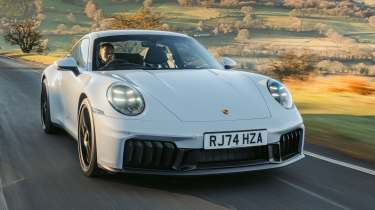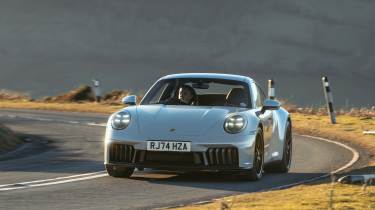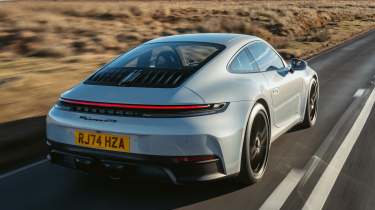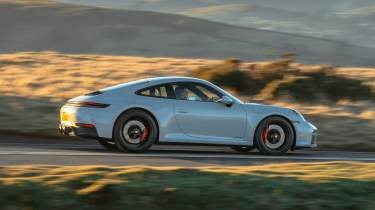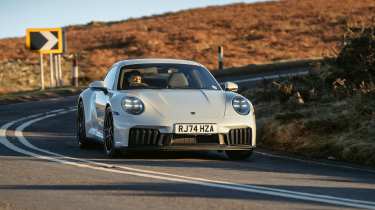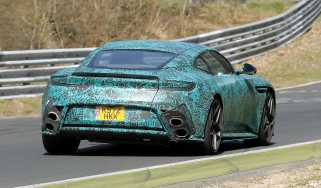Porsche 911 Carrera GTS 2025 review – the best 992 Carrera yet
A new hybrid engine and chassis upgrades have injected personality and huge capability into the 992 – it’s our favourite 911 this side of a GT3
The last thing the 992 needs is more weight and more complexity, right? Well, hold that thought, because within a few miles of driving the new 911 GTS T-Hybrid, you come to the realisation that the heaviest and most complex 992 Carrera yet is also the most capable and rewarding. You get the sense its hybrid hardware has been designed to amplify the intensity of the driving experience without awkwardly intruding, and it gives the GTS an addictive ferocity that feels part Turbo, part GT3 – in other words, it’s our top pick from the 911 range without delving into the GT products.
A huge amount of engineering has gone into achieving this. The GTS gets an all-new engine – up from 3-litres in other Carreras to 3.6 – and uses a new single turbocharger that’s reminiscent of the unit seen hanging from the underbelly of a 935 racer, but is more flexible than the old twin-turbo set-up. And as is the modern way, it also has a battery and an electric motor with the latter incorporated into the eight-speed PDK transmission, which is as slick and smooth as ever. What there isn’t is any propulsion under electricity alone. Some might see this as an opportunity missed. After all, even Lamborghini’s new V8 twin-turbocharged hybrid that runs to 10,000rpm will offer a few miles of electric range.
Not the new 911. Its hybrid system is purely about delivering more performance more efficiently, using fewer components and future-proofing the flat-six engine for as many generations to come as possible. Hence that capacity increase (the 3-litre motor is still available in the base Carrera, which now uses the turbos from the outgoing GTS, albeit detuned by 84bhp to 394bhp) and that new turbocharger. The latter is a crucial part of the T‑Hybrid system and employs an integrated electric motor positioned between the compressor and turbine wheel, allowing for the removal of the wastegate and the ability to build up boost pressure immediately, eliminating any noticeable form of lag.
More reviews
Group tests
In-depth reviews
- Porsche 911 review 2025 – Gen2 992 is the 911 for the digital age
- Used Porsche 911 (991, 2011 - 2018) review – should you buy the unloved 911?
Long term tests
Reviews
The turbos fitted to the old GTS engine took over three seconds to reach maximum boost; in the 3.6 that time is reduced to 0.8 seconds. At 27kg it weighs the same as the old twin-turbo arrangement, and it also generates 15bhp of electric power to feed back to the 1.9kWh battery that’s positioned in the front of the car, where the traditional battery once lived (this is now re-homed behind the rear seat).
At a steady cruise in eighth gear the motor is calm but gives the impression of a big capacity, torque rich engine, but find a decent road, drop down the ratios and the GTS really begins to flex. Short bursts of acceleration deliver the kind of instant responses expected from a healthy-lunged naturally aspirated engine. Your throttle inputs start an immediate chain reaction of increased revs and forward propulsion. There’s no gradual build-up as the boost increases and the turbo spools, the powertrain is simply primed and ready – even in Normal mode. And there’s no awkward lag between an initial hit of e-motor response and the engine waking up – the powertrain operates as a cohesive whole.
On its own the new flat-six generates 478bhp and 420lb ft of torque. The e-motor, meanwhile, is capable of 56bhp and 111lb ft. When the two work together, the combined peak figures are 534bhp and 450lb ft. This makes the T‑Hybrid GTS the quickest-accelerating Carrera ever, reaching 62mph in 3sec. Just 2.5sec after a full-throttle standing start – without using launch control – it will have covered 21.5 metres, some seven metres further than its predecessor. And for the first time a rear-drive Carrera is quicker to 75mph than a Carrera 4, too.
Switching to Sport Plus injects this second-generation 992 with a pure hit of adrenaline. There’s a sweetness and crispness to how it revs as the engine changes character as it climbs through its power band, eradicating the somewhat monotone delivery of its 3-litre predecessor. It’s an encapsulating tone, the crescendo building with a vigour and infectious nature that’s been missing since the Carrera models gained their turbos. At idle it chunters and grumbles like an older flat-six, too, and though the way the engine cuts in and out in low speed traffic can deliver an awkward shunt through the drivetrain, this almost adds to the mechanical feel, Nissan GT-R-style.
Porsche claims the GTS T‑Hybrid has the pace and performance of the 991-generation GT3, and while some might scoff, owners of said GT3 perhaps, the rate of engine development means it’s hard not to agree with those who work at Weissach. In auto mode the drop in ratios when you pin the throttle isn’t as quick as a GT car’s PDK, but the speed with which the GTS builds momentum is hard to ignore. The algorithm that monitors the engine speed and selects the gear ratio feels well set, with upshifts coming as the engine reaches peak speed, dropping it back into its meaty mid-range ready to go again. Which it relishes doing, time and again, mile after mile.
Select manual for the shifts and the new GTS comes to you even more, the immediacy upped further still, the engagement levels further heightened. That rapid boost-pressure build provides such an improvement in throttle adjustability that the 992.2 starts to feel more than a facelifted model. You feel more in tune and connected with the car, a more integral component in the processes being played out. It’s not that the 992.1 felt aloof and distant – the previous manual GTS was a supremely capable, involving sports car – but this new model takes those intangible elements that often left us cold and adds context and detail that was missing before.
The GTS always feels connected, but you need to work it hard to stress the chassis and reap the biggest rewards. When you do, the motor is once again an intrinsic part of everything this 911 does. On tighter routes its eager responses allow you to balance the car just-so through and out of a corner, meaning you can lean on the chassis harder and ask more from it, and all the time the GTS becomes more alive beneath you. In tight uphill turns you can balance the car on the throttle with greater precision, with a much cleaner exit as you roll off the lock and dial in the throttle. Wind the stability systems back and you can apply as much or as little corrective lock as desired, the car far more comfortable being adjusted on the throttle and riding out any slide, as there’s no longer a rush of boost to unsettle the process.
The four-wheel drive Carrera 4 GTS still has a wide window of adjustability, and is something of a revelation on track. Compared to an AMG GT, it offers more feedback, gives you more confidence and moulds to your driving in a way that can almost feel uncanny. Be neat and precise and it has huge traction and precision to draw from, but with more aggression the four-wheel drive system feels heavily rear-biased with a sense of easy, natural throttle adjustability. It readily rotates under power but feels stable and assured, finding strong forward drive as it straightens up through the exit. The fact it offers this kind of bandwidth without an array of BMW M4-style four-wheel drive modes makes it even more impressive.
On the road, the GTS’s ride is firm and it picks up surface imperfections – more so than a base Carrera, and even in the softest damper mode – but the platform's fundamental qualities still shine through, and you can carry immense speed. The chassis settles very quickly and follows your steering inputs with real accuracy, although this does mean that there’s less opportunity to enjoy the sensation of it gradually loading up into a corner.
Chassis-wise the changes are measured, with a thorough overhaul and reconfiguration of the adaptive dampers (PASM) and the standard fitment of rear-axle steering. The latter is a key contributing factor to the GTS’s agility on the road. Through tighter hairpins the nose turns in quicker, with the rear reacting accordingly to position its mass where required. As with the previous generation it’s a piece of hardware that enlivens the 911. Coupled to the more responsive and explosive engine it makes for an intoxicating package.
The rear-axle hardware isn’t a simple carry-over part, however. It’s all new for the 992.2 GTS T-hybrid with the components adapted to suit the 50kg weight increase over the previous PDK-equipped GTS (the majority of the weight gain being over the rear of the car), the 1mm narrower rear track and the wider, 315/30 x 21 rear tyres that sit on 11.5in-wide wheels. The geometry is carried over from the outgoing GTS, but the spring rates have been adapted to suit.
In terms of the dampers, their Normal and Sport settings have been recalibrated and when paired with Porsche’s Dynamic Chassis Control hardware, Sport mode reduces body roll further still. Where before a 992 Carrera needed a very specific spec to feel at its best, now the fundamental set-up of the GTS T-Hybrid feels very 911.
A manual gearbox would be the icing on the cake, but the GTS’s hybrid hardware means it’s not possible to fit one, denying some of the interaction of the previous three-pedal GTS. The latest Carrera and Carrera S are also PDK only, making the Carrera T the only manual 992.2 you can buy this side of a GT3.
The PDK in the GTS offers snappily quick upshifts, but the downshifts aren't as quick. As you’re perhaps expecting, you have to pre-empt your requirements and get the command in sooner. Ultimately, it lacks the instantaneous crispness of a GT model’s PDK, but it’s certainly not a deal breaker.
Porsche was adamant that the GTS must come in under 1600kg, and at 1595kg it does just that. The 50kg weight gain has come predominantly from the hybrid battery and the accompanying electrical architecture. The standard rear-wheel steer adds a further seven to eight kilos, and if you choose to fit the no cost-option rear seats that’s a further 10kg that goes back in.
The rest of the package remains on point. The brakes, for example, which are the optional carbon-ceramics on our car, continue to improve with each iteration and almost have a feel of cast-iron stoppers, so impressive is the modulation and feedback during hard stops. Under soft applications the pedal feels a little too light in its initial travel which may be a side effect of the GTS’s regenerative braking.
Visually the update is less expansive than the powertrain’s workover. At the front there’s a new front bumper with active aero elements in its lower section to aid cooling (the black ‘gills’ increase airflow through the car by 25 per cent) and new LED headlights that now incorporate the indicators, and when the GTS fills your mirrors the sharp creases in the bonnet give it a pseudo GT-car appearance. At the rear there’s a new full-width light bar that fully illuminates, while the GTS is all about its centre-exit sports exhaust. As an overall design the 992 still looks like a big car on the road, although it feels less so from behind its steering wheel and the new TFT digital dash and central screen.
You can settle yourself touring-car low in the driver’s seat, the tops of those front wings visible through the screen, and where both the 991 and 992 have previously felt a bit too clinical and functional, there’s something about this latest car that generates a sense of being in something special again. Granted, an Alcantara steering wheel always helps with a sports car interior and the adaptive sports seats trimmed in Porsche’s simple Race-Tex material and with leather side bolsters provide good support and a functional finish. Although given the forces this car can generate, those with a habit of taking their Carrera on track will want the benefit of the more extreme bucket seats (£4622).
And the GTS really does carry plenty of speed everywhere. Tight roads highlight its ability and agility when dealing with quick direction changes, while quicker-flowing sections reveal its enormous stability and precision. In eighth gear it feels like a 997 Turbo in fourth, such is the muscular spread of torque available. Half that gear number and it becomes almost feral, piling on speed as the tacho races to its 7500rpm red line. It’s an addictive and immersive experience, a 911 for the modern age that just so happens to have plenty to appeal to those of an older persuasion who thought it might just be going off the boil.
Price and rivals
At £132,600 the Carrera GTS T-Hybrid has crept into the big money purchase sector, where the £120,345 BMW charges for the M4 CS look very tempting, the £161,300 AMG charges for its impressive new GT 63 perhaps less so. At £165,000 Aston Martin’s Vantage is a big step up from the Porsche in terms of price and performance but the GTS T-Hybrid might just have enough to go tyre track to tyre track. It will be fascinating finding out.
Perhaps the new GTS’s biggest challenge, as is often the case with 911s, comes from within, with plenty of used, low mileage 992 911 Turbos available for similar or less money than new hybrid model.
